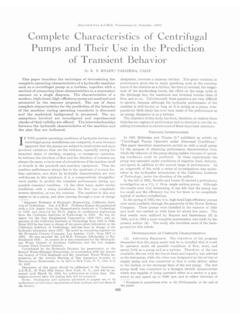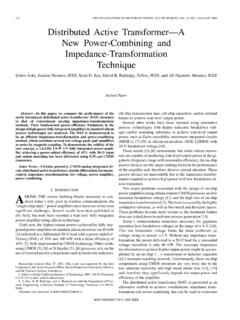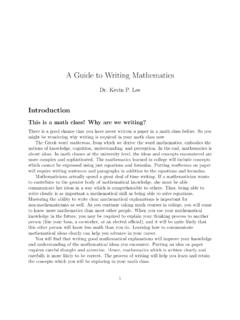Transcription of Introduction: What is the Philosophy of Science?
1 Introduction: What is the Philosophy of Science? Christopher Hitchcock What is the Philosophy of science? It is the application of philosophical methods to philosophical problems as they arise in the context of the sciences . That's not a par- ticularly helpful answer as it stands, but at least it allows us to break our original question into parts: What are the methods of Philosophy ? What are philosophical problems? How do these problems arise within different scientific fields? Philosophical Methods The first question is the most difficult. In the first half of the twentieth century, a prominent school of thought (particularly associated with the Austrian philosopher Ludwig Wittgenstein) held that the philosopher's task was to clarify the meanings of words.
2 The great problems of Philosophy , it was thought, were mere confusions result- ing from a failure to understand the meanings of the words used to frame those prob- lems. Few philosophers today would subscribe to such an extreme view; nonetheless, the clarification of meanings is still an important part of the philosopher's repertoire. Particularly important is the ability to draw distinctions between different things that a term or phrase might mean, so as to assess more accurately claims involving those terms or phrases. The chapters on genetics by Sahotra Sarkar and Peter Godfrey-Smith (chapters 13 and 14), for example, involve careful analysis of the various things that one might mean by "information.". Perhaps even more fundamentally, Philosophy involves the analysis of arguments, often aided by the formal methods and conceptual resources of symbolic logic (and other areas, such as probability theory).
3 Philosophers, when defending a position, will construct arguments in support of that position. In addition, they will examine argu- ments that have been proposed by opponents. For each such argument, they may ask: What is the structure of the argument? Is it logically valid? If not, would it be valid if one were to add certain specific premises? Does it employ inferential methods other than those of deductive logic? What are the premises of the argument? Are the premises true? - and so on. Moreover, philosophers will try to anticipate objections to their own arguments, and defend their arguments against these objections before they are even raised. Almost every Philosophy paper employs these methods to some extent or other; the two chapters on unobservable entities, by Jarrett Leplin and by Andre Kukla and Joel Walmsley (chapters 5 and 6), provide particularly clear exam- ples - both chapters examine, criticize, and propose a variety of arguments on both sides of the debate.
4 Nonetheless, it is almost impossible to isolate any uniquely philosophical methods. In the Philosophy of science, especially, there is no clear line where the Philosophy ends and the science begins. While few (but still some!) philosophers actually conduct experiments, many philosophers will freely make use of empirical fmdings to support their positions. Consider chapters 15 and 16, by Peter Carruthers and by James Woodward and Fiona Cowie, for example. These chapters tackle the question "Is the mind a system of modules shaped by natural selection?" This involves traditional philo- sophical issues, such as the relationship between the mind and the brain; it involves careful analysis of the concept "module"; but it also requires the consideration of empirical results in psychology, as well as theoretical issues in evolutionary biology.
5 Like empirical scientists, philosophers sometimes construct mathematical models of the "phenomena" that they seek to understand. In his chapter on scientific confirmation (chapter 3), Patrick Maher uses probability theory to construct a mathematical rela- tion that, Maher argues, captures important features of the relation between scientific theory and empirical evidence. In general, then, it appears that philosophers are willing to employ almost any tools that can shed light on philosophical problems. Philosophical Problems It is hard to say what makes a problem "philosophical." There are, nonetheless, certain collections of problems that, over the past two and a half millennia, have come to be seen as paradigmatically philosophical problems. Three central areas of concern are ethics, epistemology, and metaphysics.
6 This is by no means an exhaustive list - a fuller list would have to include aesthetics (the study of art and beauty), logic, social and political Philosophy , the philosophies of language, mind, and religion (not to mention the Philosophy of science itself), and the history of Philosophy . Nonetheless, the core areas of ethics, epistemology, and metaphysics intersect with all these branches of Philosophy ; understood broadly, these three areas cover much of the field of Philosophy . Ethics deals with issues of right and wrong - both the morality of specific types of behavior and also more fundamental issues concerning the ultimate sources of moral value. Epistemology deals with the nature of knowledge and belief: What is knowledge, and how is it distinguished from mere belief?
7 What are the sources of knowledge? What constitutes justified belief? Metaphysics is the most difficult to char- acterize; roughly, it involves the examination of concepts that play a fundamental role in other areas of Philosophy , and in other disciplines. For example, metaphysi- cal issues fundamental to ethics involve concepts such as the freedom of the will, and the nature of personal identity. Ethical issues in science C'- . 8c: Ethical issues can arise in a number of ways within the scientific context. Most obvi- Q). ously, technical innovation can create new possibilities whose moral status is in need c:;. CJ). of evaluation. For example, only recently has it become possible to clone large 0. mammals such as sheep. It may soon be technologically possible to clone human beings >.
8 C: (at the time of this writing, there are unsubstantiated reports that this has already c. happened). Many people react in horror at the thought of human cloning; similar ~..2. reactions met other forms of technologically aided reproduction, such as artificial :c a. insemination and in vitro fertilization. Just what, if anything, is wrong with creating Q). a genetic copy of a human being? Does this outweigh the possible benefits of cloning .c: +"'. as a form of reproductive technology, especially for individuals or couples who have .!!! +"'. no other option? Obviously, ethical theorists such as Aristotle, Kant, and Mill were not cu .c: able to anticipate these sorts of issues when developing their moral theories. s: Another set of issues arises in connection with the treatment of experimental subjects.
9 Presumably, the sub-atomic particles that are forced to follow very con- strictive paths only to be annihilated in a super-collider are not harmed in any morally relevant sense. Experiments involving human beings, or even nonhuman animals, are more problematic. For human subjects, a consensus has emerged (although surpris- ingly recently) that informed consent is essential: experimentation upon human sub- jects is permissible only when the subjects have voluntarily given their consent after being informed of the potential risks and benefits involved. By their very nature, however, experimental treatments are such that the potential risks and benefits are not fully known in advance. Moreover, the notion of consent is much more complex than it appears.
10 Various forms of coercion may affect a person's decision to partici- pate in an experiment. In medicine, there is often a power asymmetry between patient and doctor, and a patient may feel that she has to participate in order to receive the best treatment. In psychology, it is a common practice for professors to require stu- dents to participate in experiments to receive course credit. In the case of animal sub- jects, informed consent is, of course, impossible. The key issues here involve the moral status of animals. Mammals, at least, are quite capable of suffering physical pain as well as some forms of psychological distress. How is this suffering to be weighed against the potential benefits of experimentation for human beings? Recently, there has been considerable concern about the status of women and minorities in the sciences .















